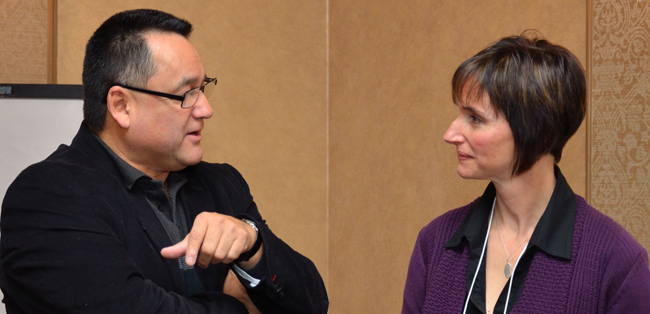Jody Porter receives Debwewin Citation for journalism excellence

By Marci Becking
UOI OFFICES (Nipissing FN) – Jody Porter, CBC journalist in Thunder Bay, is the ninth winner of the Debwewin Citation for excellence in reporting on First Nations issues.
Porter is a CBC journalist specializing in social justice reporting in Thunder Bay. Her work has involved the production of dozens of news stories and features about First Nations people.
Jody Porter worked in community papers in small towns across the country for a decade before starting as a reporter at CBC Radio in Thunder Bay. Documentary storytelling helps her escape the daily news grind and has garnered several awards. She is the editor of Strength and Struggle: Perspectives from First Nations, Inuit and Métis Peoples in Canada, published in 2011 by McGraw‐Hill Ryerson and currently being used in high schools across the country.
Porter is fond of creating radio/social experiments that take ordinary people out of their cultural comfort zones. This includes CBC Thunder Bay’s Common Ground Café series that brought strangers together to make a meal and discuss race relations in the city. She was given the 2011 Adrienne Clarkson Award, RTDNA for her work on this series. She is also a regular guest lecturer at the Department of Aboriginal Education at Lakehead University, Thunder Bay.
Director of Communications and Anishinabek News editor Maurice Switzer will present the award to Porter at the Anishinabek Nation 7th Generation Charity’s annual Evening of Excellence Awards in Sudbury on August 21st.
“Debwewin means ‘truth’ in our language,” said Switzer, “and these awards celebrate First Nation and other storytellers and journalists in our territory who do outstanding jobs of telling our stories – something mainstream media have not historically done very well. We congratulate Jody Porter on her contributions.”
Anishinabek News freelancer, Sharon Weatherall, will be awarded an Honourable Mention citation. Weatherall has been covering First Nations stories from Beausoleil First Nation and Midland area for over 10 years.
The Debwewin Citation top award was first presented in 2002 to Toronto Star journalist Peter Edwards for his reporting on the events that led to the 1996 death of Anthony “Dudley” George in Ipperwash Provincial Park. Winners have included Lynn Johnston, who introduced Anishinabek characters and communities into the storyline of her world‐famous comic strip “For Better or For Worse”.
Anyone may submit a nomination for the awards, but nominations must be seconded by Anishinabek Nation citizens.
Debwewin is an eastern Ojibwe word which translates into “truth” in English, but which literally means “speaking from the heart”. Truth is one of the Seven Grandfather Teachings of the Anishinabek people, who believe that living a good life can only be accomplished through wisdom (nbwaakaswin), love (zaagidwin), respect (mnaadendmowin), bravery (aakdehewin), honesty (gwekwaadziwin), humility (dbaadendiziwin), and truth (debwewin).
According to the Debwewin Citation terms of reference, “For storytellers and journalists, ‘truth’ should mean more than accuracy; it also implies fairness, balance and context.”
Rationale for the Debwewin Citations:
Due to the deficiencies of mainstream education curricula, most Canadians have been exposed to inaccurate and incomplete portrayals of aboriginal culture, tradition, and contemporary issues. As a result, mainstream media reporting is the primary public education source for information about Native issues, often with disastrous results.
“Aboriginal people are not well‐represented by or in the media. Many Canadians know aboriginal people only as noble environmentalists, angry warriors, or pitiful victims. A full picture of their humanity is simply not available in the media. Mainstream media do not reflect aboriginal realities very well, nor do they offer much space to aboriginal peoples to tell their own stories.” – Report of the Royal Commission on Aboriginal Peoples, 1996


